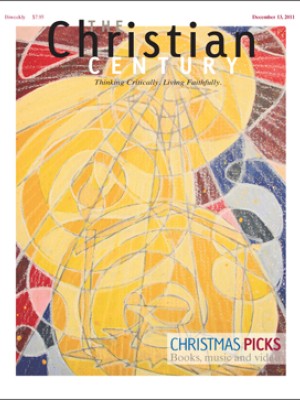Naked Spirituality, by Brian D. McLaren
In Naked Spirituality, Brian McLaren both charts an arc of the spiritual life and suggests practices to nurture the spiritual life during its different stages. The book's architecture is a bit complicated. It presents four seasons of the spiritual life. Each season has one theme and three practices. Each practice has one key word associated with it, and often some alternate words as well. If you can bear with the dizzying scheme, you'll find that inside it are countless insights.
The first season of the spiritual life, springtime, is the season of simplicity. Think, here, of a person who has returned to church after many years; think of a new convert; think of someone who has just discovered or rediscovered prayer. During this spiritual springtime, we find God in everything. In McLaren's formulation, "in Simplicity, we reach out to God in happiness. We see the world as it should be." Although there is a certain effortlessness to springtime, McLaren offers three practices that can help cultivate our gleeful attention to God in this season: invocation, or noticing that God is here; thanksgiving; and jubilant wonder at the abundance of God and God's creation.
Read our latest issue or browse back issues.
Entering the summer of the spiritual life, the season of complexity, we move from blissful, God-drenched enthusiasm to an awareness of pain, failure and limitation—one's own limits and those of one's friends and the world. We respond to this recognition of limitation and pain by seeking forgiveness and seeking change. Specifically, the three practices McLaren offers are self-examination and confession (the words associated with this practice are sorry, regret and mercy), petition (help, guidance, strength, wisdom and patience), and compassion and intercession (please, mercy, bless, peace and grace). As I read this section, I kept thinking about the etymology of complexity: its Latin root means "braid together," or "entwine." Confession, petition and intercession all have something to do with recognizing the extent to which we are entwined with others.
After complexity comes the autumnal season of perplexity. This is Job's season. Your prayers—if you can still pray—are not answered. The God you thought you knew is nowhere to be found. This is a season of angst, of disillusionment, of suffering, when "mention of God evokes feelings of ambivalence." The three practices of this season are desperate survival, rage and lament. One of the words associated with perplexity is no, the enunciation of refusal. McLaren deserves endless thanks for reminding us that estrangement and no do not represent a breakdown of the spiritual life. Rather, they are an organic part of the that life.
The season of perplexity may feel eternal, but it is not. After perplexity comes harmony. Drawing on Paul Ricœur, McLaren says that during this season, we come into our "second naïveté." There are echoes of our springtime enthusiasms, but here things are quieter, more still. Revealingly, the season McLaren associates with harmony is winter—not a threatening, hypothermal winter, but a winter of "naked trees. Frozen ponds. Hibernation. Starkness. Long, dark, silent nights, and cold days blanketed in snow. . . . Winter's rest. That chattering, hypervigilant consciousness . . . now goes silent. It takes a breath." In this season, "the world is bathed in a gentle luminosity of compassion," and we are able to see more acutely. We see our friends and neighbors, and indeed ourselves, as children of God "needing love." And we see God more clearly, too: we begin to separate God from "our God concepts," and when we speak of God, or to God,
our pronouns falter, because God is more than we understand when we say "he" "she," "it," or even "you." Our nouns stumble. . . . Even our most paradoxical and mysterious nouns break open—like "Trinity," "the Divine," "the Sacred One," or "the Holy One"—because even they can't fully contain or define the mystery to which they point.
This is a season of "deepening," and it is characterized by the practices of beholding (the mantras include ah, maybe and amen); of saying yes, or of "deepening by joining" ourselves to God, to other people and to projects of transformation; and of contemplative resting. If complexity is Job's time, perhaps the patron saint of harmony is James Joyce's Molly Bloom: "Yes I said yes I will Yes."
Naked Spirituality is very astute. I will return most frequently to McLaren's chapters on invocation. This first spiritual practice is about noticing—noticing where we are, noticing what is right around us, noticing that God is here, wherever it is that we are. McLaren associates invocation with the word here, and he notes that throughout the Bible people's relationships with God turn on this here-ness: people noticing God is often marked either by God asking, "Is anybody here?" or by an individual saying to God, "Here I am."
In his discussion of invocation, McLaren is calling us to pay attention—and he is right to give attentiveness pride of place as the first of his 12 practices, for it underpins the other 11.
In complexity, we pay attention to limitation, and we pay attention to ways we are braided together with our neighbors. In perplexity, we pay attention to God's elusiveness. And in harmony, perhaps, we simply attend.







